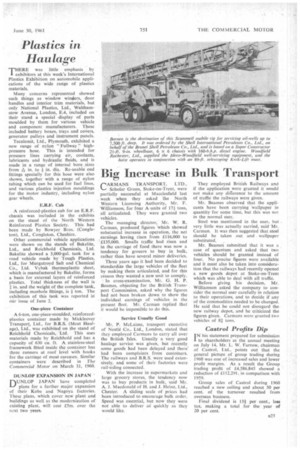Big Increase in Bulk Transport
Page 57

If you've noticed an error in this article please click here to report it so we can fix it.
rARMANS TRANSPORT, LTD.. Scholar Green, Stoke-on-Trent, were partially successful at Macclesfield last week when they asked the North Western Licensing Authority, Mr. F. Williamson, for four A units of 171 tons, all articulated. They were granted two vehicles.
The managing director, Mr. W. R. Carman, produced figures which showed substantial increase in operation, the net earnings having risen from £116,000 to • • £135,000. Smalls traffic had risen and in the carriage of food there was now a tendency for grocers to buy in bulk, rather than have several minor deliveries.
Three years ago it had been decided to standardize the large vehicles of the fleet by making them articulated, and for this reason they wanted a new unit to comply.
In cross-examination, Mr. G. H. P. Beames, objecting for the British Transport Commission, asked why the figures had not been broken down to show the individual earnings of vehicles in the present fleet. Mr. Carman replied that it would be impossible to do this.
Service Usually Good
Mr. P. MeLaime, transport executive of Nestle Co., Ltd., London, stated that they employed Carmans to carry all over the British Isles. Usually a very good haulage service was given, but recently some goods had been delayed and there' had been complaints from customers. The railways and B.R.S. were used extensively, and some of their factories were rail-siding connected.
With the increase in supermarkets and large grocery stores, the tendency now was to buy products in bulk, said Mr. A. J. Macdonald of H. and J. Heinz, Ltd., Chester. A sliding scale of prices had been introduced to encourage bulk order. Speed was essential, but now they were not able to deliver as quickly as they would like.
They employed British Railways and if the application were granted it would not make any difference to the amount of traffic the railways were given.
Mr. Beames observed that the applicants have been carrying wallpaper in quantity for some time, but this was not in the normal user.
Steel was mentioned in the user, but . very little was actually carried, said Mr. Carman. It was then suggested that steel should be taken out and . wallpaper substituted.
Mr. Beames submitted that it was a case of quantum and asked that two vehicles should be granted instead of four. No precise figures were available and it must also be taken into consideration that the railways had recently opened a new goods depot at Stoke-on-Trent which was able to deal with all traffic.
Before giving his decision, Mr. Williamson asked the company to consider the normal user carefully in relation to their operations, and to decide if any of the commodities needed to be changed. He said that he could not disregard the new railway depot, and he criticized the figures given. Carmans were granted two vehicles of 8,„ tons.
Castro! Profits Dip
IN his statement prepared for submission to shareholders at the annual meeting on July 14. Mr. L. W. Farrow, chairman of Castro!. Ltd.. points out that the general picture of group trading during 1960 was one of increased sales and lower profit margins. As a result the Group trading profit of £4,586.845 showed a reduction of £112,291, in comparison with 1959.
Group sales of Castrol during 1960 reached a new ceiling and about 50 per cent. of the turnover resulted from overseas business.
Final dividend is 13i per cent., less tax, making a total for the year of 20 per cent.




































































































































































